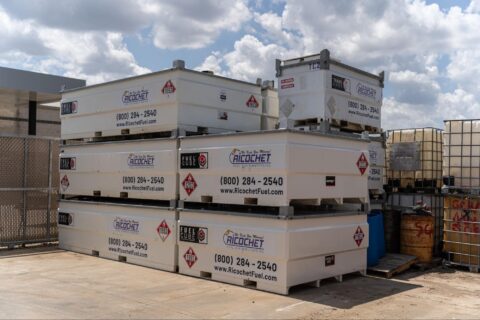The Cost of Poor Bulk Fuel Storage: How Businesses Lose Thousands in Wasted Fuel
Bulk fuel storage is one of the very important areas of the industries, especially for those that rely on the fuel to provide power to their daily processes. If the fuel is not well-maintained, it may ruin the budget of the business. Poor fuel storage is the main reason businesses overspend on the costs that they do not fully realize, including fuel evaporation loss, degradation, theft, and operational failures.
This blog talks about the impacts of poor fuel storage on operations, where the fuel is being wasted, and what steps can be taken to avoid that. Whether you own a small fleet or a large-scale enterprise, this blog will assist you in blotting out that profit-draining hole.
1. Fuel Degradation: Wasting Fuel from Within
In time, fuel left in unsuitable conditions degrades. Microbial growth, oxidation and sedimentation are promoted by exposure to water, air and temperature variations.
Common Fuel Storage Mistakes:
- Using unsealed or single-walled tanks
- Failing to control condensation buildup
Example of Business Fuel Waste:
In the engine, contaminated diesel can clog sprayers in the injectors, reduce engine efficiency and harm expensive equipment. The increase in fuel consumption and associated maintenance costs results from these internal issues.
2. Fuel Evaporation Loss: Money in Thin Air
One of the least visible yet most common bulk fuel storage issues is evaporation. When fuel is stored in inadequately sealed tanks, particularly in warm climates, it vaporizes.
The Cost of Poor Bulk Fuel Storage:
- Significant volume loss over time
- Increased frequency of refuelling
- Reduced fuel efficiency due to volatile compound loss
Evaporative losses can amount to thousands of litres annually, translating to substantial monetary loss for high-usage businesses.
3. Leaks and Spills: Slow Bleeds That Add Up
Leaks, whether from old tanks or careless transfers, are a hidden threat. Poor fuel storage often involves outdated containers, improper connections, or damaged seals.
Why It Matters:
- Direct fuel loss is expensive
- Leaks lead to environmental damage
- Spills increase liability and can lead to fines
For instance, a minor 1-litre leak daily equals 365 litres per year. Multiply that by current diesel prices, and it becomes clear how business fuel waste adds up quietly.
4. Theft and Unauthorised Access
In remote or under-monitored locations, unsecured tanks are a magnet for fuel theft. Tracking discrepancies is next to impossible without fuel monitoring systems or physical safeguards.
Impact of Poor Fuel Storage on Operations:
- Unexplained fuel shrinkage
- Delayed projects due to unexpected shortages
- Loss of trust within internal teams
And that small-scale theft over months can add up to five figures per year without even realising it’s happening.
5. Regulatory Non-Compliance
Regulations are strict for bulk fuel storage and also to ensure that hazards are not created within the facility itself. For businesses, poor maintenance, inadequate containment, or poorly documented procedures can create problems.
Consequences Include:
- Fines and legal actions
- Cleanup costs for contamination
- Increased scrutiny from regulatory bodies
In many cases, being a reactive rather than proactive user of storage compliance tools is more expensive in the long term.
6. Equipment Damage and Downtime
Fuel contamination often leads to equipment failures. Degraded or contaminated water causes pollution through clogging filters, damaging pumps, and reducing the life of the equipment.
Operational Impact:
- Project delays due to breakdowns
- Higher repair and maintenance costs
- Reduced productivity and missed deadlines
How to Prevent Fuel Waste in Bulk Storage
Fortunately, businesses can take such clear steps as to minimise loss and increase efficiency.
-
Use Quality Storage Solutions
Seek out double-walled tanks, spill containment systems, as well as corrosion-resistant materials that will help to prevent leaks and damage.
-
Monitor Fuel Levels Accurately
Install automated tracking systems to be able to detect theft, evaporation, or normal usage patterns in real time.
-
Conduct Regular Maintenance
Have a schedule to inspect the leaks, water accumulation, and tank integrity monthly. Replace tanks annually, and treat fuel if you’re storing it for a long time.
-
Improve Security Measures
Install locks, fencing, and surveillance on fuel storage areas. Try fuel cards or PIN cards for pumps.
-
Train Your Staff
Show your team how to handle fuel properly, report problems if anything arises, and follow the correct way to refuel.
Conclusion
The fact is that the cost of poor bulk fuel storage is not visible at first, but over time, it can eat away at the company’s bottom line. It can be unaffordable in terms of cost, and cannot be neglected, it could occur from evaporation, leaks, theft, or noncompliance.
So, it becomes necessary to find out what you are wasting in terms of fuel and subsequently take smarter steps in covering safety, avoiding out-of-pocket loss, and saving the operating costs to also boost efficiency.


